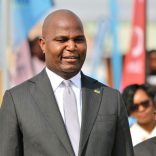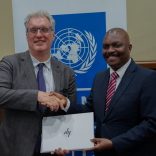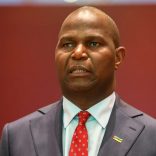Mozambique: Chapo urges young Africans to transform the continent
CPLP: Portuguese PM champions freedom of residence establishment – “The sooner the better”

Lusa (File photo) / Portuguese Pime Minsiter António Costa (right) with Mozambique's Foreign Minister oldemiro Baloi, photographed in Brasilia
The Portuguese government presented a proposal for the mobility of citizens at the 11th Conference of Heads of State and Government of the CPLP which is coming to an end today in Brasilia.
Portuguese Prime Minister António Costa said on Monday in Brasilia that it would be “very positive” if freedom of residence in the Community of the Portuguese Speaking Countries (CPLP) were established, and that it was “basic and fundamental” to the group, saying: “if I could, I would do it now.”
“The sooner the better,” he told reporters, noting that the project is listed in the Brasilia Declaration as “one of the priorities for the coming years”, and that all countries must work for “freedom of movement” in the Lusophone space.
“I hope we are all in the same spirit and feel that this space is not only a political and economic cooperation area, but is truly a space of citizenship,” he said.
“It is essential that the CPLP is rooted in its day-to-day citizens,” Costa said, sharing “much more than the language,” and for that, it is “essential” to press forward with “freedom of movement within the CPLP”.
At a time when the organisation is the target of criticism for its inefficiency and detachment from citizens, the Portuguese prime minister said that the proposal would help citizens feel that “the CPLP is something for them” and “root the future of a lasting CPLP project”.
“The award of freedom of residence, recognition of university diplomas and recognition of the portability of social rights, in particular social security, are essential conditions so that we can all move,” he added.
“For years we went on absurdly posing difficulties to the recognition of diplomas of Brazilian dentists and, more recently, we thought it was absurd to raise doubts about the diplomas of Portuguese engineers,” he explained.
Prime Minister Costa also defended the rights of political participation, to “create better conditions for the inclusion of all in the communities where they live”.
He explained that at “the EU level there is only a common policy in terms of visas. There is no policy on the freedom of residence”, so Portugal is free “to contract with its CPLP partners the conditions for granting residence in Portugal”.
The prime minister stressed that “the residence permit grant also solves the problems of visas, because a person who has a residence permit does not need a visa to enter Portugal”, adding that “this would be a great gain for citizenship” in CPLP.
The CPLP comprises Angola, Brazil, Cape Verde, Guinea-Bissau, Equatorial Guinea, Mozambique, Portugal, Sao Tome and Principe and East Timor.













Leave a Reply
Be the First to Comment!
You must be logged in to post a comment.
You must be logged in to post a comment.